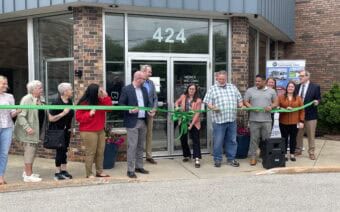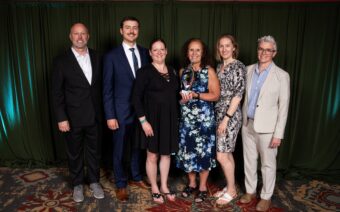
December 28, 2022
NORTHEAST WISCONSIN – Lisa Hurley, caregiver and dementia care specialist (DSC) for the Aging & Disability Resource Center (ADRC) of Sheboygan County, said an estimated 2,500 people in Sheboygan County are living with some form of dementia.
“I stay away from things like struggling or suffering – we say they’re living with dementia,” she said.
Hurley said those not familiar with the senior care world sometimes believe most of these individuals are living in some sort of care facility.
However, she said, that isn’t true.
“80% of the people living with dementia in Sheboygan County are living in the community,” she said. “They’re going to the grocery store, and they’re going to the bank, and they’re going to the dentist and they’re riding the transit system. So, people within our community are interacting with those living with dementia. It may directly impact 80%, but it indirectly impacts a much broader range.”
Ariel Koning, dementia care specialist with the ADRC of the Lakeshore serving Manitowoc and Kewaunee Counties, said similar statistics statewide prompted Wisconsin to implement a collaborative effort toward supporting dementia-friendly projects.
Recognizing this, Hurley said, the State of Wisconsin decided in 2015 to put together a plan in a push to make the state dementia friendly.
“(The state) put a toolkit together to get the different counties throughout the state to move forward to make their individual county – some counties have cooperated together in some of the smaller counties – dementia friendly as part of that state dementia plan,” she said.
Koning said part of this plan includes a dementia care specialist in every county.
“Dementia care specialists… we are actually the only state that has this type of program,” she said. “A lot of other states are looking to us to provide support and resources… So, Wisconsin has this great model of having a dementia care specialist in every county in the state.”
Koning said part of a DCS’s work is helping establish dementia-friendly communities.
“And one of the ways we do that is by providing free training for any local area business,” she said.
Purple Angel program
The Purple Angel program offers free, onsite training to businesses and organizations in their respective community to recognize, communicate with and create a welcoming and safe environment for people living with dementia and for their caregivers.
Koning said that includes a description of the top 10 warning signs of somebody who might be in the early stages of developing memory impairment from the Alzheimer’s Association.
“You’re seeing somebody who’s very confused or agitated or overstimulated and you start to notice they look a little bit more anxious,” she said. “I tried to develop as much empathy in my trainees as possible, so they can try to be in the shoes of someone with dementia, and then how they can best support them if they’re in a situation.”
Koning said DSCs try to be as flexible as they can with the training because it is important to have as many staff members present during the training as possible.
“If not all of them can be present, that’s okay, I can then send them the presentation I use and they can use that to train the rest of their staff that weren’t able to be present at the initial training,” she said. “And then I like to follow up every year to see if there has been turnover. (Or if they) want any additional education.”
Hurley said something she does at the beginning of each training session is ask if anyone in attendance has a connection with someone living with some form of dementia.
“I usually ask, ‘does anybody have a professional or personal connection with someone living with dementia,’” she said. “Almost 95% of people will raise their hand. A lot of people are connected personally, but they may not connect that with their job.”
Koning said dementia-friendly business training is similar to other emergency-type training.
“It’s about 30 minutes, give or take, depending on if people have questions or specific examples they’ve encountered in their business,” she said. “Then I like to take my time and explain in those different situations and how you might best help somebody with dementia or early signs of memory impairment.”
At the end of the training, Hurley said businesses receive a Purple Angel decal they can display showing the community they went through dementia-friendly training.
“They’ll get window clings they can put on their business doors or windows, basically showing that they are dementia friendly and family members that might be with someone or helping them do things, they will see that as well,” she said.
Importance of the training
Hurley said DCSs see the dementia-friendly training as a win-win.
“We know in this day and age, with places being short-staffed, that for them to put that hour aside for us for training may not be easy, so we want to make it worth it for them,” she said. “And of course, the community is the one and the people living with dementia in the community are the ones that benefit.”
Koning said in the end, the training lets the community know their place of business is accessible and safe for people with dementia.
“Dementia is actually a growing concern in not just our state, but in the world,” she said. “As we all are living longer, the risk of developing dementia only gets higher and higher. I want to let family caregivers know that a dementia diagnosis doesn’t mean you have to all of a sudden start looking at nursing homes to admit your loved ones, there actually is a lot of support for caring for them in the home. The aspect of having our community dementia-friendly trained will do a lot to help ease that you know that struggle.”
Deborah Tews, owner of The River Coffee and Cream in Wrightstown, said it participated in the Purple Angel training through Brown County’s ADRC and its Purple Angel program because it was in line with its guest-centric focus.
“We want to be a place that is warm and welcoming,” she said. “When I learned about the Purple Angel training program, I was eager to provide an opportunity for additional training to enhance our soft skills used in serving those customers who may have dementia.”
Tews said the training was helpful at getting staff “behind the eyes” of its guests who need a little extra time, care and consideration.
//s3.amazonaws.com/appforest_uf/f1672259948247x695241574453433500/richtext_content.webpLisa Hurley said nearly all businesses can benefit in some way from the Purple Angels training but stresses the importance of public-interaction business participation. Submitted Photo
“Another benefit was the evaluation of our physical environment, in terms of safety and a welcoming feeling,” she said. “We took a fresh look at the ‘little things’ that make a difference in all areas of our business so we can better serve our community with love.”
Alex Falish, the head of brewing operations at Noble Roots Brewing Company in Green Bay, said it participated in the Purple Angel training for a variety of reasons.
“First of all, many of us have been directly impacted by dementia through loved ones, so it’s something that is close to our hearts,” he said. “We also know many of us are likely to be impacted at some point in the future.”
Falish said he is also aware that members of the brewing company’s immediate community who either visit its taproom or stop by its food trucks, are affected by dementia, or are caregivers.
“It was important to us that our staff have the tools to make those visits as safe, comfortable and enjoyable as possible for those people,” he said. “We strongly believe this is a training that would be beneficial to any business or organization. It’s important that we, as a community, continue to support people with dementia and their caregivers as best we can.”
Hurley said nearly all businesses can benefit in some way from the training but stresses the importance of public-interaction business participation.
“The more people that understand about the disease, the more we can make sure we are working with it and dealing with it and making sure the person is treated with respect,” she said.
More information on the state’s dementia-friendly initiative, as well as more specifics on each county’s Purple Angels program, can be found on the Wisconsin Department of Health Service’s website at, dhs.wisconsin.gov/dementia.
 Getting students excited about manufacturing
Getting students excited about manufacturing Driving NEW collaboration, diversity, opportunity
Driving NEW collaboration, diversity, opportunity








